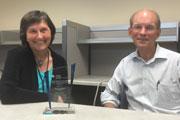

Dr. Amy Justice, M.D., M.Sc., Ph.D. was recognized for her dedicated leadership of the Clinical and Health Services Research Core (CHSR) at a recent CIRA event. Dr. Justice is a founding member of the CHSR Core and has served as Director of the Core for seven years. She was lauded by research colleagues for her abiding commitment to the field of HIV comorbidity and aging, for her numerous contributions to CIRA's continued growth, innovation, and productivity, and for ensuring that clinical and health services research issues are duly considered in CIRA supported science and practice. Dr. Justice will step down from the role of CHSR Core Director on June 30, 2014 due to the growth and direction of her own research program. She will continue to serve as a CHSR Core member.
Dr. Brian Forsyth, MBChB, FRCP(C) will assume the role of Director of the CHSR Core going forward. Dr. Forsyth is Professor of Pediatrics and Yale Child Study Center, an attending physician in the Yale Pediatric AIDS Program, Deputy Director for CIRA, a longstanding member of the CHSR Core, and also an active member of the Community Research Implementation (CRI) Core. He is presently the Medical Director of Yale-New Haven Hospital Pediatric Primary Care Center. His academic work has largely focused on addressing the impact of the HIV epidemic on women and children. For over eleven years, he has worked with colleagues at the University of Pretoria in South Africa to build capacity for social science HIV-related research in resource-poor countries. Dr. Forsyth's international work has also contributed significantly to the training of others in HIV-related research.
The CHSR Core focuses on developing and supporting research on HIV and comorbidities in clinical settings, domestically and globally, and mentoring new investigators in health services and clinical HIV prevention and treatment research. Dr. Forsyth will lead the Core to achieve these goals in the years ahead with emphasis on implementation science to address gaps in the HIV care continuum, particularly in small urban settings in New England, as well as other global settings.
Published: Monday, June 23, 2014

